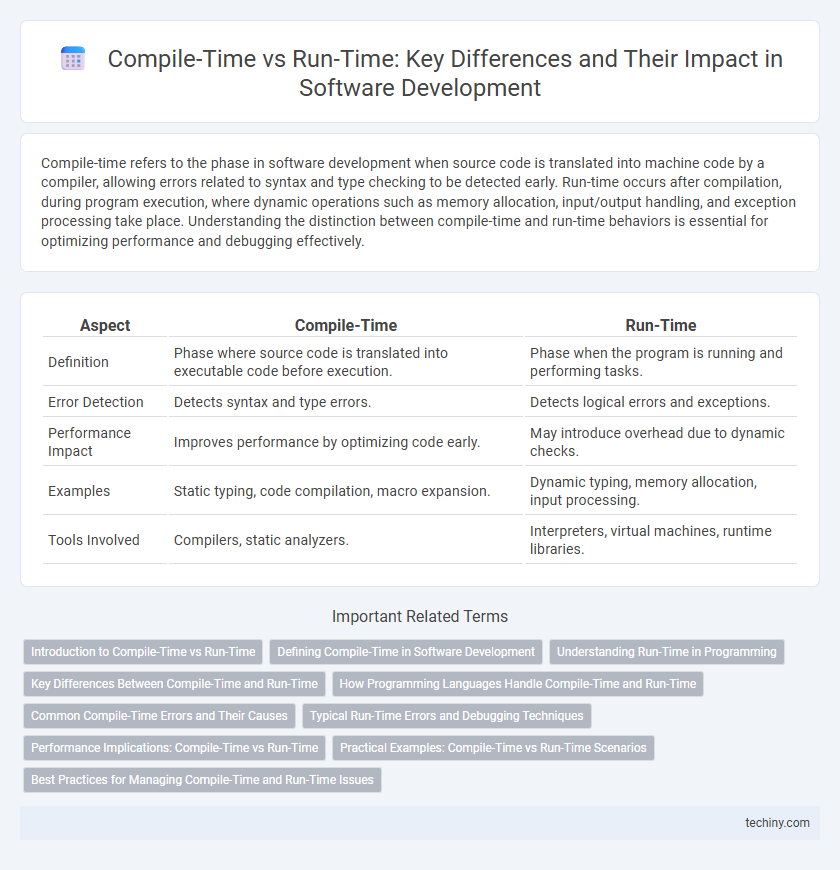Compile-time refers to the phase in software development when source code is translated into machine code by a compiler, allowing errors related to syntax and type checking to be detected early. Run-time occurs after compilation, during program execution, where dynamic operations such as memory allocation, input/output handling, and exception processing take place. Understanding the distinction between compile-time and run-time behaviors is essential for optimizing performance and debugging effectively.
Table of Comparison
| Aspect | Compile-Time | Run-Time |
|---|---|---|
| Definition | Phase where source code is translated into executable code before execution. | Phase when the program is running and performing tasks. |
| Error Detection | Detects syntax and type errors. | Detects logical errors and exceptions. |
| Performance Impact | Improves performance by optimizing code early. | May introduce overhead due to dynamic checks. |
| Examples | Static typing, code compilation, macro expansion. | Dynamic typing, memory allocation, input processing. |
| Tools Involved | Compilers, static analyzers. | Interpreters, virtual machines, runtime libraries. |
Introduction to Compile-Time vs Run-Time
Compile-time and run-time represent two critical phases in software development that affect program execution and error detection. Compile-time involves translating source code into machine code and catching syntax errors before execution, while run-time refers to the period when the program is actively executing and handling dynamic behaviors or logic errors. Understanding the distinctions between compile-time checks, such as type validation, and run-time operations, including memory allocation and exception handling, is essential for optimizing performance and ensuring robust software functionality.
Defining Compile-Time in Software Development
Compile-time in software development refers to the phase when source code is translated into machine code by a compiler, enabling syntax and semantic error detection before execution. This stage ensures that type checking, memory allocation, and code optimization are performed, improving runtime efficiency and program stability. Errors identified at compile-time prevent faulty code from running, enhancing overall software reliability.
Understanding Run-Time in Programming
Run-time in programming refers to the period when a program is executed on a computer, allowing dynamic operations such as memory allocation, input/output processing, and error handling. Unlike compile-time, which involves code analysis and optimization before execution, run-time manages real-time behaviors, including variable state changes and function calls. Understanding run-time environments, including interpreters and virtual machines, is crucial for debugging and performance optimization in software development.
Key Differences Between Compile-Time and Run-Time
Compile-time refers to the phase in software development when source code is translated into executable code by a compiler, enabling early detection of syntax errors and type checking. Run-time occurs when the compiled program is executed, handling dynamic operations such as memory allocation, input/output processing, and error handling. Key differences include error detection timing, with compile-time catching static errors before execution, while run-time manages dynamic behavior and runtime exceptions during actual program execution.
How Programming Languages Handle Compile-Time and Run-Time
Programming languages handle compile-time by performing syntax analysis, type checking, and code optimization before execution, ensuring errors are caught early and improving performance. During run-time, languages manage memory allocation, execute program logic, and handle dynamic features like polymorphism and exception handling through interpreters or virtual machines. Statically typed languages emphasize compile-time checks, while dynamically typed languages rely more on run-time type resolution and error handling.
Common Compile-Time Errors and Their Causes
Common compile-time errors in software development include syntax errors, type mismatches, and undeclared variables, which occur when the code violates language rules or contains incompatible data types. These errors prevent the program from compiling successfully and typically arise due to missing semicolons, incorrect variable declarations, or invalid function calls. Detecting and resolving these issues early ensures smoother code execution and reduces runtime failures.
Typical Run-Time Errors and Debugging Techniques
Typical run-time errors in software development include null pointer exceptions, memory leaks, and array out-of-bound errors, which occur when code executes and can cause program crashes or unpredictable behavior. Debugging techniques such as using breakpoints, step-through execution, and memory profiling tools help identify the exact source of errors by monitoring program flow and variable states during run-time. Employing integrated development environment (IDE) debuggers and automated testing frameworks enhances the detection and resolution of run-time issues efficiently.
Performance Implications: Compile-Time vs Run-Time
Compile-time optimization enables faster and more efficient code execution by identifying and resolving errors, optimizing algorithms, and allocating resources before runtime. Run-time performance relies heavily on the runtime environment, dynamic memory management, and just-in-time (JIT) compilation, which may introduce latency and reduce execution speed. Efficient software development balances compile-time optimizations with runtime adaptability to maximize application responsiveness and minimize resource consumption.
Practical Examples: Compile-Time vs Run-Time Scenarios
Compile-time scenarios include type checking, syntax validation, and constant expression evaluation, enabling early detection of errors before program execution. Run-time scenarios involve dynamic memory allocation, user input processing, and exception handling, allowing programs to respond flexibly to varying conditions during execution. Practical examples highlight compile-time safety through static type systems in languages like C++, whereas run-time adaptability is evident in dynamic typing and reflection features in languages like Python.
Best Practices for Managing Compile-Time and Run-Time Issues
Effective management of compile-time and run-time issues in software development involves rigorous static code analysis and automated testing to catch syntax errors and type mismatches early. Implementing comprehensive logging and exception handling during run-time enhances system reliability and facilitates quick diagnosis of unexpected behaviors. Leveraging continuous integration pipelines integrates these practices, ensuring consistent code quality and faster identification of defects across development cycles.
Compile-time vs Run-time Infographic

 techiny.com
techiny.com